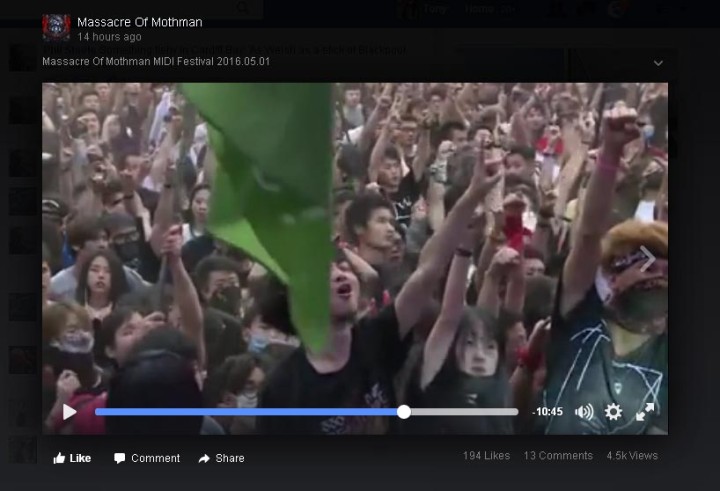Chinese band Sin performed at Taihu Midi Festival in Suzhou City, in east China’s Jiangsu Province, April 30 to May 2, 2016. The sights told of a different China and gave pause to reflect on why the authoritarian Communist Party perpetually worries about the nation’s explosive youth.
Rockers will know that this mash (not mass) catharsis is a healthy release from the pressures of urgent youth and is all to the good but for the preceding generation indeed it is a shake-up, and while for some it can lead to a wake-up, commonly it results in a clamp down.
In North Korea – another country billing itself as Communist – there is an attempt to discipline that youth into a uniform march to direct those energies into the so-called revolution, which, if it was indeed a true revolution would be a wise guidance but the old style still in play in that grey and dusty land curtails the essential revolutionary creativity that stems from the freedoms that roam abroad in those chaotic moments when the human being insists on its affirmation.
There is no such thing as a conditioned revolution – but there is and must be a nonviolent revolution.
The sounds of Sin scream of everything deep inside yet look at how easy the smiles arise even from among all that melee; and how moderate the Rolling Stones seem today…
In the run up to this now annual rock music festival in China, several other music festivals were cancelled (mostly in Beijing), and the rhetoric (quoting chinamusicradar.com) is “…around alternative music as ‘western propaganda’ intensified after remarks to that effect from President Xi Jinping.
“In August 2015, the Ministry of Culture blacklisted 120 songs off online streaming sites for ‘vulgarity’, the bulk of them tunes from local hip-hop groups like Yin San’er. Even bands that were granted permits, such as metal overlords Megadeth, had to play a farcical set with half their ‘controversial’ songs as instrumentals.”
Things western are placed in opposition to ‘things Asian’, or Chinese in this instance and there is a truth there, all the worst of what is seen as Kulture USA because of its flashiness, hits the human sensitivities, not only Asia, or the Chinese, but those of any sane being pertaining to a functioning society hoping for a decent future.
In the chinamusicradar.com paragraphs titled, Analysis, further details emerge: “But it’s trite to merely dismiss this as misinformed and retrograde. Let’s be clear: IT IS, but at the heart of this is a series of complex issues that the music industry needs to address and help untangle. There is, for instance, the continued belief in policy circles that the alternative music industry is little more than drugs and propaganda – just nihilistic wasted youth going down morally dubious paths. See, for instance, the punitive prohibition handed down to the MIDI Music School in Beijing.
“There are important questions here to think about for 2016 and the years ahead: how are music business dealing with policymakers and governmental bodies? How can we shift the discourse to see Chinese alternative music as a valuable source of, say, soft power?
“Speaking of power, all these moves also signal that music is now important. It’s role in crafting the ‘Chinese Dream’ crucial. From January 2016, Internet Streaming sites have been asked to remove objectionable content from their catalogues. Cultural policing of music, all music, became a reality in 2015 – and this fundamentally impacts every layer of the music business.
“The more government oversight the greater risks for entrepreneurs with ideas, and a colder atmosphere for innovation, specifically at the lower end,” the analysis expounds, “When the 330 Metal Festival was cancelled abruptly in Beijing, promoters (among them dedicated fans of local metal music) lost close to 13,000 USD. This will no doubt produce a chilling effect on the creative side of this industry.”
Talking about Beijing, as numerous festivals have been cancelled, there is a “burgeoning bureaucratic load to organize even the easiest of shows, and the (forced or otherwise) shutdown of mid-size music venues meant that Beijing’s position as a wider conduit for local bands was severely challenged in 2015.
“While the experimental and punk scene is still thriving, it’s become a harder city to hook an industry on. There is now a thick glass ceiling for bands with wider ambitions, with many of them switching focus completely to the US and Europe, having ‘saturated’ the local market. This is a shame, because there is still an audience here to build.”
To read the commentary in full see: http://www.chinamusicradar.com/live-music/radar-on-2015-three-trends-that-defined-the-year/
To see and hear Sin go to:
https://www.facebook.com/midifestival/?fref=photo
or better, to Warren Yu page










